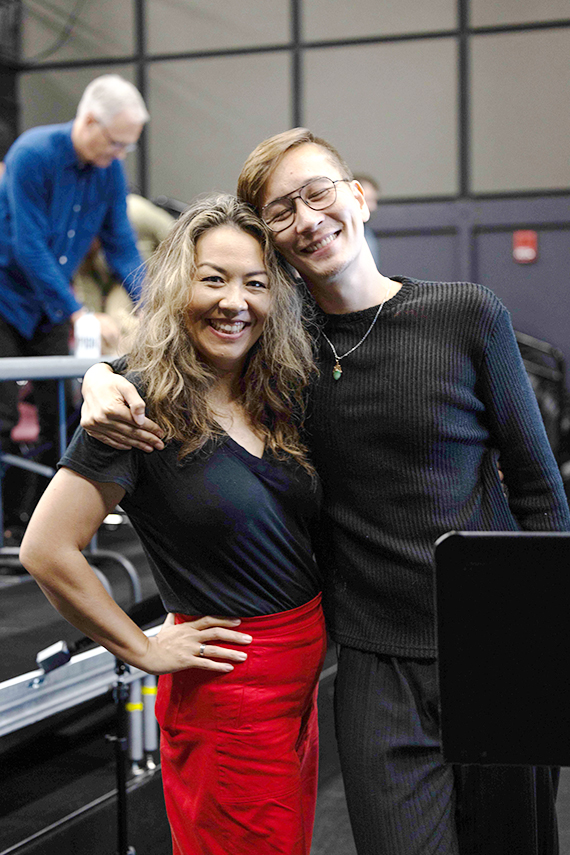
Gil Asakawa
Even if you haven’t seen the opera, most people know the title “Madama Butterfly,” Giacomo Puccini’s famous work that debuted in 1904.
It’s part of the operatic canon, a classic. But when the Boston Lyric Opera announced it would mount “Butterfly” in the fall of 2020, the world had different plans. Covid came along and shut down everything everywhere, all at once. By the spring of 2021, anti-Asian hate crimes were in the headlines, and then eight people were killed in Atlanta. Six of the victims were Asian women.
The BLO took an unprecedented step. The company reached out to Phil Chan, a dancer and activist who had co-founded Final Bow for Yellowface, an organization that calls out racist Asian stereotypes in classic ballet works like “The Nutcracker.” He also wrote a book with the same title. The BLO asked Chan to moderate a series of online discussions, “The Butterfly Process.”
The intent was never to cancel the opera, says Chan, who loves opera, including “Madama Butterfly” and Puccini’s other works, such as the equally problematic “Turandot.” After overseeing the discussions for the BLO, the chrysalis of a new, modern “Butterfly” was born.
The BLO then asked Chan to helm the production.
He wrote a new libretto and is directing the opera, with the story set not in Japan of the 1890s, but instead in 1940s California. The main characters, Cio-Cio-san and B. F. Pinkerton, fall in love on the eve of the attack on Pearl Harbor and the subsequent incarceration of more than 120,000 people of Japanese descent during World War II. She’s a Chinatown nightclub singer who’s sent to a concentration camp, and he is sent off to fight in the Pacific, not realizing she’s pregnant.

BLO Artistic Adviser Nina Yoshida Nelsen and Stage Director Phil Chan at a recent rehearsal for “Madama Butterfly” (Photo: Kathy Wittman)
Chan admits he’s Chinese American. “You know, I’m not Japanese, my family was not incarcerated. I’m thinking am I the right person to tell this story?” he asked.
So, he relied on the BLO’s artistic advisor and dramaturg, Nina Yoshida Nelsen, who is biracial Japanese whose grandmother was imprisoned at Poston in Arizona during WWII. She co-founded the Asian Opera Alliance in 2021 and has performed in “Butterfly” dozens of times over her career. For Chan’s reimagining, she drew on her family history.
“She is the beating heart of this production,” Chan said. “Her family was incarcerated, so this is very personal. Just working with her brought out the human history of this in a very personal way.”
Bringing the JA Perspective
Nelsen acknowledges her JA roots. Her grandfather was in the 442nd Regimental Combat Team, and her grandmother’s family was incarcerated. But she wasn’t part of a JA community, having been born in Santa Barbara, Calif.
She recalled, “Growing up, you’re as American as you can be, and you keep your head down, and you do your work and you get good grades. We grew up with Japanese food on New Year’s Day, and there were some words that I never knew the English words for like shoyu. But I wouldn’t say that I identified as ‘Japanese’ until people started typecasting me into Japanese roles. It wasn’t until people started telling me I was Japanese that I had to look into what does that mean and what does that mean for me.”
She found that meaning in “An American Dream,” an opera that tells the story of a Japanese American and German American families during the war. Her character, which she portrays since it first opened in 2015, is much like her grandmother when she was in camp. And then during the height of Covid, she co-founded the Asian Opera Alliance.
“In the spring of 2021, right after the shootings in Atlanta, we started to see opera companies around the United States post on their social media saying, ‘We support our Asian artists,’ similar to what we saw post-George Floyd with all the Black artists,” she said. She saw one post from an opera company that made a generic call for an Asian American soprano.
That’s when she realized her career had been built on her ethnicity. “It was all ‘Butterfly,’ ‘American Dream,’ ‘Turandot.’ There was no, like, ‘Marriage of Figaro’ or ‘La Boheme’ or anything else. The only way we’re ever seen in opera is as Asian.”
Nelsen thought about it and realized over a busy decade of work that she had only sung three non-Asian roles. “I was shocked by this,” she said. “And because I knew I had been pigeonholed into Asian roles, but I didn’t know how bad it was.”
She and a friend formed the Asian Opera Alliance, which advocates for AAPI artists on its website and social media. She knew of Chan, but the two had only spoken once before she met him through the BLO, which asked her to participate in the Butterfly Process panel discussions. Now, they’re creative partners in this revamped “Butterfly.”
Preserving the Classic in a New Context
Chan says again that the intent has never been to cancel “Butterfly.”
“It’s about finding a new way to tell this story with a little bit more nuance, and something that addresses the American story but without changing the Puccini music,” he said. “I think that was our biggest challenge — the music is good. That’s why people like it. That’s why people buy tickets. And it’s, I mean, it’s like gut wrenching, it’s beautiful. So, how do we keep the music but not change the intention of what the work is and still make it feel artists have artistic integrity for today. This is not radical, this is not the woke Butterfly, it’s just changing the setting.
“But yes, you know, it has to deal with the sexism, the Orientalism, the exotic suffocation, the sexualization, the violence in the opera,” he continued. “It’s not perfect. I’m not saying this is like now a perfect version. But, it’s a version that at least shows the pain points so that the audience can be a little critical about it while keeping the music as is. At the end of the day, I want the audience not to notice all the work and just be able to see a beautiful story.
“I think that’s why art is powerful because it can take something that feels like it’s a history lesson and actually make it a human story and make you feel something,” he concluded. “And it’s my hope that after someone sees this story, they’ll think about how we see each other with more nuance and more empathy better.”
(The Boston Lyric Opera’s “Madama Butterfly” will be staged Sept. 14-24 at the Emerson Colonial Theatre, 106 Boylston St. in Boston. The New England JACL chapter is sponsoring “Our Story: Cultural Legacies of Japanese American Incarceration,” a free conversation and performance with the BLO that will be performed in person and livestreamed online at https://blo.org/event/our-story-cultural-legacies-of-japanese-american-incarceration/.)
Gil Asakawa is the author of “Tabemasho! Let’s Eat! The Tasty History of Japanese Food in America.”



